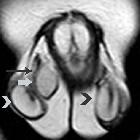Adenomatoid tumors of the scrotum







Adenomatoid tumors of the scrotum are benign, solid extratesticular lesions that can originate from the epididymis, tunica vaginalis, or spermatic cord (90% derived from the funiculus).
Epidemiology
They are the most common extratesticular neoplasm, and most common tumor of the epididymis, and occur more often in the lower pole than in the upper pole by a ratio of 4:1.
Clinical presentation
Usually an incidental finding, adenomatoid tumors manifest as a small (usually under 2 cm), painless scrotal mass, with the majority diagnosed in patients aged 20-50 years. They are typically unilateral and occur more frequently on the left side.
When they grow non-invasively into the testicular parenchyma, they can simulate intratesticular disease.
Radiographic features
Ultrasound
- well-defined, usually oval extratesticular mass with variable echogenicity although most are isoechoic to the epididymis
- usually solid although can be completely cystic
- range in size from a few millimeters to a few centimeters
MRI
MR imaging can aid in determining the paratesticular origin of the lesion.
Signal characteristics
- T2: low signal intensity relative to the testicular parenchyma
- T1 C+ (Gd): show enhancement
Treatment and prognosis
They are benign with no reports of recurrence or metastatic disease after excision .
Differential diagnosis
General imaging differential considerations include:
- peritesticular lipoma
- peritesticular rhabdomyosarcoma
- peritesticular liposarcoma
- supernumerary testes: a rare condition in which more than two testes are present
- epididymitis
- scrotal tuberculosis
See also
Siehe auch:

 Assoziationen und Differentialdiagnosen zu adenomatoider Tumor des Skrotums:
Assoziationen und Differentialdiagnosen zu adenomatoider Tumor des Skrotums:
